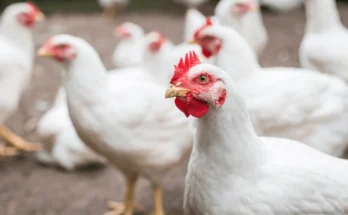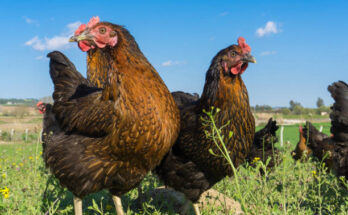The Essential Guide to Calculating Space Required for Chickens
When it comes to keeping chickens, providing them with adequate space is crucial for their well-being and breeding practices. The space required for chickens is often underestimated, but it plays a significant role in their overall health and productivity.
In this post, we will delve into the importance of space for chickens and how it directly impacts their quality of life and ability to breed successfully. We’ll explore the specific spatial needs of different chicken breeds and provide practical insights for ensuring that your chickens have the space they need to thrive.
By understanding the significance of space for chickens, you’ll be better equipped to create a comfortable and conducive environment for your flock, ultimately leading to healthier and happier chickens. So, let’s dive into the essential considerations for providing the right amount of space for your feathered friends.
Recommended Space per Chicken
When it comes to providing space for your chickens, adequate room is essential for their well-being, both physically and mentally. Each chicken should have enough space to move around comfortably, exhibit natural behaviors, and reduce the risk of stress and aggression.
How Space Affects Chicken Well-being
Proper space allocation in a chicken coop directly impacts the overall well-being of the birds. Sufficient space allows chickens to roam, scratch, and dust bathe, promoting physical exercise and natural behaviors. Conversely, overcrowding may lead to stress-related issues, feather pecking, and aggressive behavior.
Utilizing Multiple Spaces for Different Breeds
For breeding purposes and to maintain purebred chickens, using multiple smaller spaces can be beneficial. This approach allows for easier separation of different chicken breeds, preventing undesired interbreeding and ensuring breed purity.
Separating Aggressive Chickens
In instances where aggressive behavior is observed, individual separation may be necessary. Providing a separate space for aggressive chickens reduces the risk of injury to other flock members and mitigates pecking order disputes.
Recommended Space Requirement
As a general guideline, each chicken should have a minimum of 2-3 square feet of coop space, with an additional 8-10 square feet of outdoor space for free-ranging. However, these recommendations can vary based on factors such as the size and breed of chickens, as well as the coop’s design and ventilation.
Ensuring ample space for your chickens is crucial for their physical health and mental well-being, and it plays a significant role in maintaining a harmonious flock environment.
Importance of Adequate Space
Chickens, like any living creature, require adequate space to thrive. Insufficient space can have significant negative impacts on their physical and mental well-being.
Physical Well-being
Inadequate space within a coop or run can lead to various physical issues for chickens. Limited space increases the risk of injuries, such as pecking and fighting, as they compete for resources. Additionally, overcrowding can result in health problems, including the spread of diseases and parasites. Proper space allocation is crucial for ensuring the physical health and safety of chickens within a flock.
Mental Well-being
Limited space not only affects the physical health of chickens but also takes a toll on their mental well-being. When confined to cramped quarters, chickens experience stress, anxiety, and frustration, which can manifest as aggressive behavior and abnormal tendencies. Providing sufficient space allows chickens to exhibit natural behaviors, reducing stress and promoting their overall mental well-being.
In breeding scenarios, utilizing multiple smaller spaces for sectioning different chicken breeds can be advantageous for maintaining purebred lines and managing aggressive chickens. When it comes to separating aggressive chickens, providing adequate space for isolation can prevent disturbances within the flock, ensuring the safety of all chickens.
It’s recommended to provide a minimum of 2 to 3 square feet of coop space per chicken, and at least 8 to 10 square feet of outdoor run space per chicken to support their well-being and natural behaviors. Adequate space allocation is a fundamental aspect of responsible chicken keeping, promoting a healthy and harmonious environment for these birds. We have a resource here to check to understanding your chicken’s behaviour and it’s meaning.

Breeding Practices and Space
When it comes to breeding chickens, the space plays a crucial role in maintaining breed purity and preventing crossbreeding. This section will explore the advantages of using separate spaces for breeding, the impact of space on chicken well-being, and how to handle aggressive chickens. Let’s dive into the details.
Sectioning for Breeding
Separate spaces for breeding offer several advantages. By allocating distinct areas for different chicken breeds, you can effectively maintain breed purity and prevent unintended crossbreeding. This practice is essential for preserving specific breed characteristics and genetic traits. It also allows breeders to control mating and ensure that only desired pairings occur, contributing to the overall quality of the flock.
Additionally, using multiple smaller spaces can be beneficial for sectioning different chicken breeds for breeding purposes. It provides a structured approach to managing various breeds, reduces the risk of accidental mating, and facilitates focused monitoring of individual breed populations.
Space Considerations for Well-Being
Adequate space is crucial for the physical and mental well-being of chickens, especially during the breeding process. Insufficient space can lead to stress, aggression, and territorial conflicts among chickens. By providing ample room for each bird, breeders can minimize the negative impact of crowding and promote a healthier breeding environment.
Handling Aggressive Chickens
In cases where aggressive behavior is observed, segregating the aggressive chickens into separate enclosures is essential. This isolation not only protects the other chickens from harm but also allows the aggressive bird to be managed individually. Providing adequate space in these segregated areas is crucial to reduce stress and facilitate behavior management. Sometimes social behaviours such as pecking order may develop to bullying, requiring intervention. You can read about pecking order here.
It is recommended to allocate a minimum of 4 square feet of space per chicken in the coop. However, offering additional space is always beneficial, especially during the breeding phase, to ensure the well-being and comfort of the birds.
Remember, a well-designed breeding space can positively impact the breeding process and contribute to the overall health and quality of the flock. By considering the space requirements and implementing proper sectioning practices, breeders can create a conducive environment for successful and ethical breeding practices.

Space for Aggressive Chickens
When it comes to raising chickens, ensuring sufficient space for each bird is crucial. This is especially true when dealing with aggressive chickens, as crowding can exacerbate their behavior. Providing adequate space not only promotes the well-being of aggressive chickens but also ensures the safety and harmony of the entire flock.
Impact of Space on Aggressive Chickens
Aggressive behavior in chickens can be triggered or intensified by cramped living conditions. When aggressive chickens are confined in a small space, they may become territorial and engage in pecking or bullying behaviors. This can lead to injuries and stress among the flock, affecting egg production and overall welfare.
Recommended Space Requirements
For aggressive chickens, it’s recommended to allocate a minimum of 10-12 square feet of space per bird in the coop. This additional space helps mitigate aggression and reduces the likelihood of territorial disputes. Providing ample space enables aggressive chickens to establish their own territories, reducing the potential for conflicts with other flock members.
Using Multiple Spaces for Breeding and Separation
In scenarios where aggressive behavior persists, utilizing multiple smaller spaces can prove beneficial. Creating separate enclosures within the coop allows for the segregation of aggressive chickens to minimize disturbances among the rest of the flock. Moreover, this approach is advantageous for breeding purposes and maintaining the purity of specific chicken breeds.
Secluding Aggressive Chickens
When dealing with highly aggressive chickens, isolating them in a designated area within the coop is advisable. The separated space should be equipped with its own essentials, such as food and water, to ensure the well-being of the isolated bird while preventing disruptions to the rest of the flock. This approach safeguards the harmony of the flock while addressing the needs of the aggressive chicken.
Well-Being of Aggressive Chickens
Providing adequate space for aggressive chickens not only addresses their physical comfort but also promotes mental well-being. With ample space, aggressive chickens can establish their own territories, reducing stress and minimizing confrontations. This can contribute to a more harmonious and productive flock environment.
In conclusion, allocating sufficient space for aggressive chickens is essential for maintaining a peaceful and healthy poultry environment. By considering the recommended space requirements and implementing separation strategies, it’s possible to mitigate aggressive behaviors and ensure the well-being of the entire flock.
Conclusion
In conclusion, providing adequate space for chickens is crucial for their overall well-being and productivity. Proper spacing not only ensures physical comfort for the birds but also plays a significant role in minimizing aggressive behavior and promoting successful breeding practices. By allowing chickens to have ample space, poultry farmers can create a conducive environment that supports healthy and contented flocks, ultimately leading to better egg production and overall farm efficiency. Understanding the importance of space for chickens is essential for maintaining a thriving and sustainable poultry operation.



